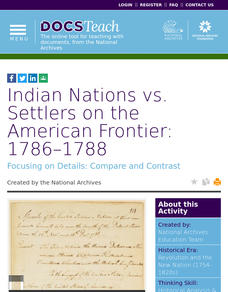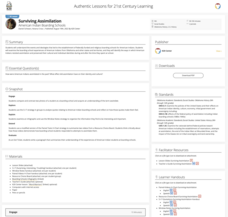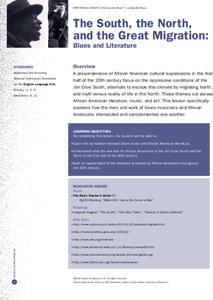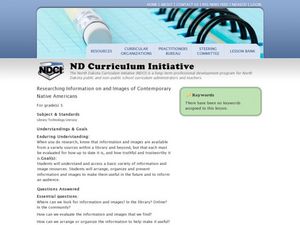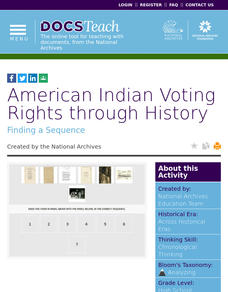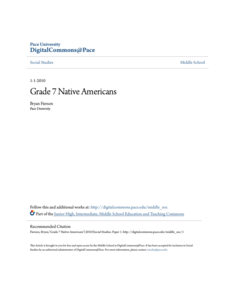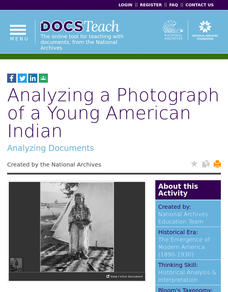DocsTeach
Indian Nations vs. Settlers on the American Frontier: 1786–1788
Once Americans won the Revolutionary War, their quest to gain land did not end. An interesting activity focuses on Americans' expansion into the frontier following the war and how it conflicted with Native Americans living in the area....
Curated OER
Celebrate Joy Harjo: The First Native American Poet Laureate
Introduce middle schoolers to Poet Laureate Joy Harjo with a lesson that not only explains the role and duties of the Poet Laureate but also contains a video in which Harjo explains what she sees as her responsibility as a Native...
Core Knowledge Foundation
Native Americans Tell It Again!™ Read-Aloud Anthology
A 154-page anthology explores the life, culture, and history of Native Americans. Eight lessons follow the routine of introducing the reading, conducting the reading, discussing it, doing word work, then taking part in an extension...
National Endowment for the Humanities
Factory vs. Plantation in the North and South
North is to factory as South is to plantation—the perfect analogy for the economy that set up the Civil War! The first lesson plan in a series of five helps teach beginners why the economy creates a driving force for conflict. Analysis...
K20 LEARN
Surviving Assimilation: American Indian Boarding Schools
The boarding school era is "a history that all of us need to know about," says Secretary of the Interior Deb Haaland. Here's a lesson plan that examines that history. High schoolers examine video interviews of Native Americans who detail...
Curated OER
Colonial North America
Showcase the religion, conflicts, daily life, and politics of Colonial North America. A very well-done presentation highlights all the major colonial groups, social norms, demographics, and political struggles of the time. Perfect for an...
Curated OER
The American Revolution: 1775 - 1783
Track the ins and outs and wartime strategies used by both the British and the Americans during the Revolutionary War. Multiple comparisons are made between both factions, maps, statistical data, images, and light text is used throughout...
DocsTeach
Analyzing a Letter About American Indian Voting Rights
An informative activity focuses on the law preventing Native Americans from voting until 1947. Scholars read documents from the Office of Indian Affairs, complete an online worksheet, and participate in group discussion. Academics learn...
National Woman's History Museum
Red Power Prevails : The Activism, Spirit, and Resistance of Native American Women
Native American women powered the American Indian Movement and other social changes, but they are often forgotten by history books. Examining a series of resources, including a documentary film, photographs, secondary sources, and social...
Curated OER
Native Americans of the Chesapeake Bay: Using Primary vs. Secondary Sources
Discover the rich Native American culture that existed at the time of early European exploration into the Chesapeake region through analysis of several primary and secondary sources.
Stanford University
Native American Rights
It's time for scholars to put their knowledge of primary sources to the test. A helpful assessment uses photos to test pupils' knowledge of how to analyze primary sources and determine their time periods. High school social...
Curated OER
Native American Story Necklaces
Combine a study of Native American history and art in this lesson. Learners discuss the importance of fetishes in Native American culture, the history of necklaces, and create their own works of art. Your class will find this to be both...
Curated OER
The South, the North and the Great Migration: Blues and Literature
Here is a complex lesson plan that interweaves the history of the Jim Crow South and the Great Migration with the study of poetry, art, and blues music from the Harlem Renaissance. The plan helps young historians develop a deep...
Roy Rosenzweig Center for History and New Media
American Indians and their Environment
People could take a page in ingenuity and survival from the Powhatans. Deer skins became clothes, and the members of the Native American group farmed the rich Virginia soil and hunted in its forests for food. Using images of artifacts...
Curated OER
Researching information on and Images of Contemporary Native Americans
Research information and find pictures of Contemporary Native Americans in order to help 3rd graders understand what images are available from a variety of resources. They will present their research and pictures to the class. In turn,...
Curated OER
The American War for Independence
High schoolers complete a unit of lessons that examine the goals of the Americans during the Revolutionary War. They explore an online interactive map of major campaigns, read and analyze primary source documents, and analyze diplomatic...
Curated OER
Development of American Political Parties: The Two-Party System
Was American politics always bound to the two-party system? Learn how the two-party system developed, why third parties tend not to do so well, and all the various political parties that have emerged throughout US history. Each party is...
National Gallery of Art
The First African American Regiment
Young historians examine a memorial sculpture of the first African American regiment in the Civil War, and then compare how the experiences of the regiment are portrayed in letters and poetry, as well as in the motion...
Curated OER
The American Revolution: 1775-1783
Casting the American Revolution into a bright, informative light, this presentation details many key facts about the strategies and decision during the revolutionary campaigns. The latter half of the slides prompt viewers to examine why...
Curated OER
Shadows of North Carolina's Past
Students construct a timeline of four major culture periods in Native American history from studying archaeological evidence cards.
American Battlefield Trust
Contrasting the North and South Before the War
Fundamental differences between the North and South led to the South adopting a system of enslaved labor. These abstract ideas become concrete when class members create a standing cube using information provided in the resource. Young...
DocsTeach
American Indian Voting Rights through History
Vote ... it's your right! An enlightening lesson examines the history of voting rights for Native Americans. Leaners analyze primary documents and place them in chronological order. Academics also create a list of other events that took...
Pace University
Native Americans
Introduce middle schoolers to the First Nations that inhabited the Northeast during the Age of Exploration with a series of activities designed for differentiated groups.
DocsTeach
Analyzing a Photograph of a Young American Indian
A true glimpse of the past, Angelic La Moose smiles back from more than 100 years ago. Young learners examine the picture of a young girl on a Montana Native American reservation from 1913 to comb it for historical details. A form, which...
Other popular searches
- North American Geography
- North American Biomes
- North American Indians
- American Northeast
- North American History
- North American Deserts
- North American
- North American Map
- North American Indian Tribes
- North American Climate Zones
- North American Explorers
- North American Dream


